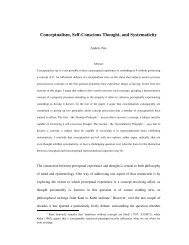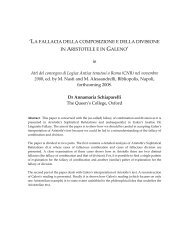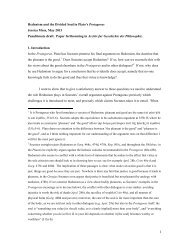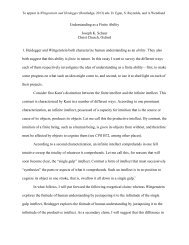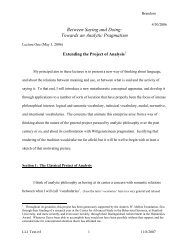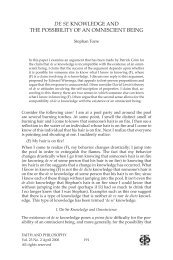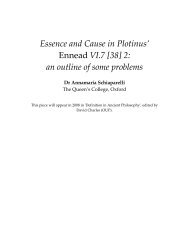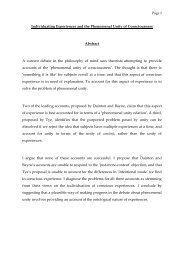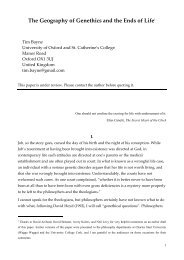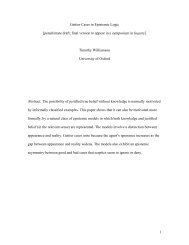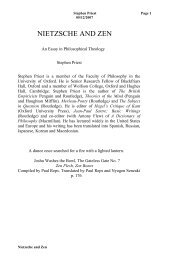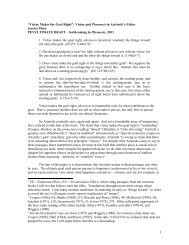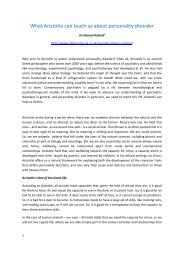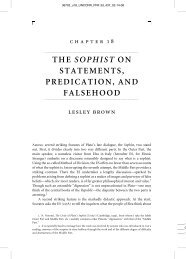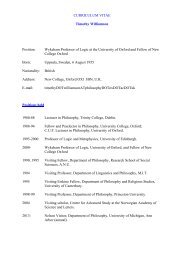OxfordPhilosophy - Faculty of Philosophy - University of Oxford
OxfordPhilosophy - Faculty of Philosophy - University of Oxford
OxfordPhilosophy - Faculty of Philosophy - University of Oxford
You also want an ePaper? Increase the reach of your titles
YUMPU automatically turns print PDFs into web optimized ePapers that Google loves.
focus<br />
<strong>Philosophy</strong><br />
<strong>of</strong> Physics<br />
at <strong>Oxford</strong><br />
<strong>Oxford</strong> is the world’s<br />
preeminent centre for<br />
philosophy <strong>of</strong> physics. The<br />
<strong>Faculty</strong> is ranked outright first<br />
for philosophy <strong>of</strong> physics in the<br />
latest Philosophical Gourmet<br />
Report and contains the largest<br />
concentration <strong>of</strong> philosophers<br />
<strong>of</strong> physics in the world.<br />
The philosophy <strong>of</strong> physics community is<br />
very active, both in teaching and research.<br />
The undergraduate Physics and <strong>Philosophy</strong><br />
course celebrated its fortieth anniversary<br />
this year, and we have just launched a<br />
new specialist Master <strong>of</strong> Studies course<br />
in <strong>Philosophy</strong> <strong>of</strong> Physics. It is aimed at<br />
students whose undergraduate degree<br />
is primarily in physics and who otherwise<br />
might not have applied for graduate study in<br />
<strong>Philosophy</strong> at <strong>Oxford</strong>.<br />
http://users.ox.ac.uk/~ppox<br />
Image: Courtesy <strong>of</strong> Max Tegmark<br />
Research interests<br />
The first decades <strong>of</strong> the 20th<br />
century saw the comfortable<br />
certainties <strong>of</strong> Newtonian physics<br />
thrown into doubt, first by<br />
Einstein’s theories <strong>of</strong> special<br />
and general relativity, and then<br />
by the counter-intuitive principles<br />
<strong>of</strong> quantum mechanics. <strong>Oxford</strong><br />
philosophers are making<br />
significant contributions to the<br />
attempt to make sense <strong>of</strong> these<br />
important conceptual changes.<br />
Hilary Greaves, Simon<br />
Saunders, Chris Timpson, and<br />
David Wallace are applying<br />
themselves to quantum<br />
mechanics, especially<br />
the baffling ‘many worlds’<br />
interpretation developed by<br />
the physicist Hugh Everett<br />
in 1957. Everett argued that<br />
quantum mechanics predicts the<br />
existence <strong>of</strong> a vast number <strong>of</strong><br />
Pr<strong>of</strong>ile: Harvey Brown<br />
In 2006, Harvey Brown,<br />
Pr<strong>of</strong>essor <strong>of</strong> <strong>Philosophy</strong> <strong>of</strong><br />
Physics, received a prestigious<br />
Lakatos Award for his book<br />
Physical Relativity (2005). The<br />
Award is given annually for an<br />
outstanding contribution to the<br />
philosophy <strong>of</strong> science. Physical<br />
Relativity is an attempt to prise<br />
apart the core <strong>of</strong> Einstein’s<br />
theories <strong>of</strong> relativity – the special<br />
and the general – from the<br />
issue <strong>of</strong> space-time reality. In<br />
the case <strong>of</strong> the special theory<br />
<strong>of</strong> 1905, Harvey examines<br />
the historical underpinnings<br />
branching worlds within a single<br />
universe, in which everything<br />
that could happen (according to<br />
the theory) does happen. The<br />
subtle issue as to how quantum<br />
indeterminacy, and hence<br />
probability, fits into this picture<br />
has been the subject <strong>of</strong> detailed<br />
study by the <strong>Oxford</strong> group.<br />
The light that relativity<br />
theory sheds on traditional<br />
philosophical problems related<br />
to the nature <strong>of</strong> space and time,<br />
posed by the ancient Greeks<br />
and more recently by Newton,<br />
Descartes and Leibniz, has<br />
been the subject <strong>of</strong> recent<br />
research by Frank Arntzenius<br />
and Harvey Brown, as well as<br />
Oliver Pooley, who was awarded<br />
a Philip Leverhulme Prize in<br />
2007 for work by an outstanding<br />
young scholar.<br />
<strong>of</strong> Einstein’s work, and why<br />
it was that Einstein later had<br />
misgivings about some aspects<br />
<strong>of</strong> the way he first formulated<br />
his theory. The book questions<br />
the now fashionable view that<br />
it is the geometric structure <strong>of</strong><br />
four-dimensional space-time<br />
itself that provides the central<br />
explanatory principle in the<br />
theory (something Einstein<br />
himself never defended). At the<br />
end <strong>of</strong> the book, Harvey argues<br />
that the subtle way in which<br />
special relativity fits into general<br />
relativity – Einstein’s theory<br />
<strong>of</strong> gravity – is fully compatible<br />
with the somewhat unorthodox<br />
position set out earlier. He<br />
concludes that caution is<br />
in order when it comes to<br />
interpreting Einstein’s theory <strong>of</strong><br />
gravity as a theory about the<br />
very fabric <strong>of</strong> space-time.<br />
In 2007, Harvey Brown was<br />
elected a Fellow <strong>of</strong> the British<br />
Academy. He served as<br />
President <strong>of</strong> the British Society<br />
for the <strong>Philosophy</strong> <strong>of</strong> Science<br />
from 2007 to 2009.<br />
7



